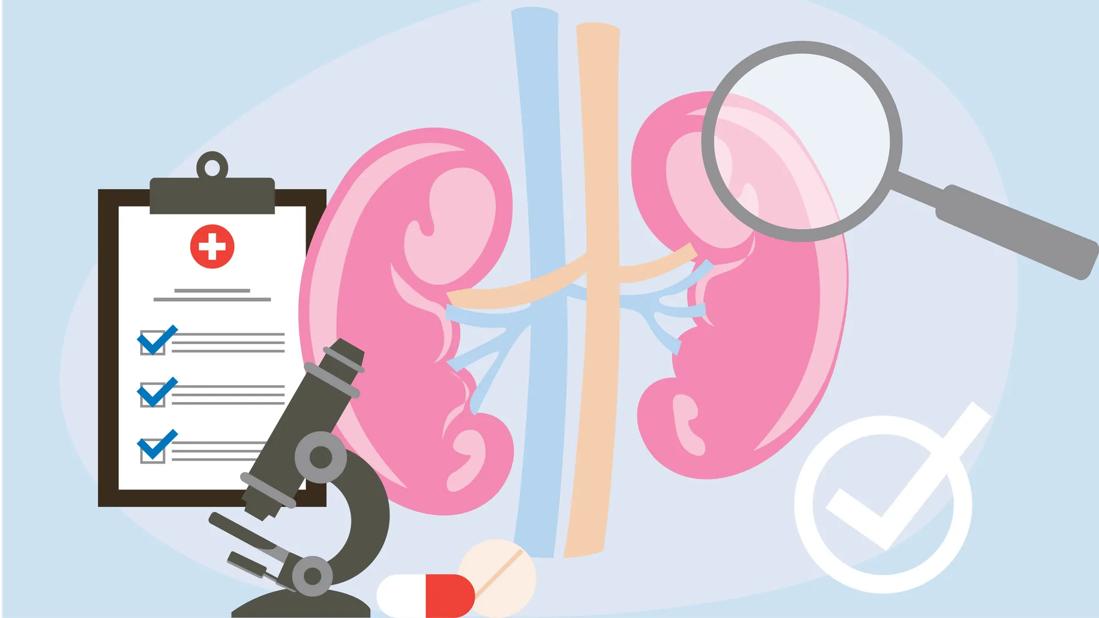You may not notice any symptoms of kidney disease until later stages

Image content: This image is available to view online.
View image online (https://assets.clevelandclinic.org/transform/8f9aba9c-f6a3-44db-8605-ef87ecc5cfd1/kidney-Disease-Diagnosis-1366379079-770x533-1_jpg)
Oversized kidneys, with microscope, magnifying glass and clipboard showing diagnosis
It often comes out of the blue. You feel fine. But the doctor says they found protein in your urine or high levels of creatinine in your blood. Your biopsy confirms it: You have kidney disease.
Advertisement
Cleveland Clinic is a non-profit academic medical center. Advertising on our site helps support our mission. We do not endorse non-Cleveland Clinic products or services. Policy
Now, you’re wondering what happens next. What’s it going to feel like living with IgA nephropathy (IgAN) or complement 3 glomerulopathy (C3G)?
We asked nephrologist Corey Cavanaugh, DO, for some insight.
It’s rare to experience symptoms of IgAN or C3G unless they progress to late-stage kidney disease, which may or may not happen.
“You can be totally asymptomatic, particularly when you’re living with mild or moderate kidney disease,” Dr. Cavanaugh says. “In fact, it’s common to have kidney disease and not even know it.”
If your condition worsens, you’ll start feeling the impact of poor kidney function throughout your body. For some, the symptoms come on slowly. For others, the change is more obvious.
But the “if” is key when we’re thinking about disease progression.
Not everyone who has IgAN or C3G will experience a decline in kidney function over time. For some, the condition will never accelerate. Others find that medications are enough to keep things in check.
If your condition worsens and symptoms do appear, knowing what to expect can help. Dr. Cavanaugh shares common late-stage symptoms for people living with IgAN or C3G and how to slow your condition’s progress.
Kidney disease severity is classified into five different stages. Each stage is associated with your estimated glomerular filtration rate, a measure of how well your kidneys filter substances.
Advertisement
Stage 1 is very mild, while stage 5 is kidney failure — when your kidneys have stopped working or are close to it. Stage 5 is when your provider will recommend beginning dialysis or seeking a kidney transplant, if those are your wishes. (Note: You can be eligible to join the U.S. National Kidney Transplant Waiting list when you have stage 4 kidney disease.)
Dr. Cavanaugh says many people won’t have any symptoms of kidney disease until they reach stage 5. But some people notice symptoms beginning in stage 3.
“Oftentimes, the symptoms you feel associated with kidney diseases like IgA nephropathy or C3G come from a buildup of toxins that your kidneys can no longer clear out, which tend not to be noticeable until you reach kidney failure,” he explains.
Although kidney failure can feel different for different people, there are some common symptoms to keep an eye out for:
Managing chronic illnesses that impact your kidney function can help slow the progression of conditions like IgA nephropathy and C3G.
Your kidney function impacts your whole body. So, when it declines, it can kick off other conditions (comorbidities). It’s a cycle: kidney disease causes other diseases. Those diseases make your kidney damage worse, which gives rise to new problems. And around and around we go.
The primary way you manage IgAN or C3G is by addressing the issues your comorbid conditions cause, in the hopes of slowing or stopping new organ damage.
“One of the most common complications of kidney disease is high blood pressure,” Dr. Cavanaugh reports. “Managing your blood pressure is very important to slowing the loss of kidney function.”
Reduced kidney function raises your risk of developing:
If you develop any of these conditions — or others — managing them (with your provider’s help) is crucial. Not addressing comorbidities can increase the burden on your kidneys and accelerate the damage. It may even mean having to start dialysis sooner.
After being diagnosed with IgA nephropathy or C3G, visit your provider regularly to assess your kidney function, as well as your overall health.
Advertisement
If you’re living with a chronic condition or are at risk of developing one, your provider will likely prescribe medications and suggest lifestyle changes, like adjustments to your diet and exercise routine.
No one wants to have to manage a chronic condition like kidney disease. And no one wants to have to consider a future on dialysis or waiting for a transplant. But if you’ve been diagnosed with IgA nephropathy, C3G or another kidney disease, it’s important to understand your condition.
Do your research. Track your health. And ask your provider about steps you can take to slow your condition’s progress and minimize its effects on your life.
Advertisement

Sign up for our Health Essentials emails for expert guidance on nutrition, fitness, sleep, skin care and more.
Learn more about our editorial process.
Advertisement
Tracking your weight, swelling, blood pressure and more may help you — and your provider — figure out what’s driving secondary FSGS
Regular visits with your nephrologist, at-home testing and symptom tracking ensure you’re doing all you can to preserve kidney function
Testing can both reveal the likelihood that you’ll pass on complement 3 glomerulopathy and identify possible treatments
It’s a way to further glomerular disease research and expand your treatment options
Expect some new prescriptions, as well as recommendations to avoid other medications
When you have kidney disease, low-sodium and nutrient-rich foods are the dietary ‘golden rules’
The best predictors of kidney cancer’s return are cancer type, stage and grade after surgery
The biggest concern is that they could rupture
Prioritize your health by managing stress, strengthening your social connections and getting quality sleep
Bolsters, blankets, pillows and blocks can offer extra support, stability and comfort
Allergies, postnasal drip, asthma or reflux could be to blame for a cough that won’t quit